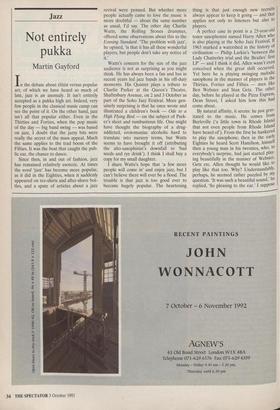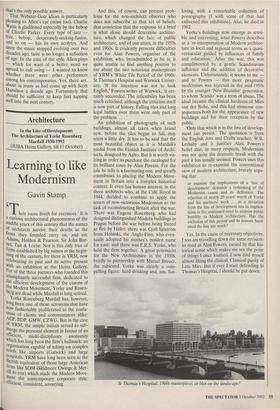Jazz
Not entirely pukka
Martin Gayford
In the debate about elitist versus popular art, of which we have heard so much of late, jazz is an anomaly. It isn't entirely accepted as a pukka high art. Indeed, very few people in the classical music camp can see the point of it. On the other hand, jazz isn't all that popular either. Even in the Thirties and Forties, when the pop music of the day — big band swing — was based on jazz, I doubt that the jazzy bits were really the secret of the mass appeal. Much the same applies to the trad boom of the Fifties. It was the beat that caught the pub- lic ear, the chance to dance.
Since then, in and out of fashion, jazz has remained relatively esoteric. At times the word 'jazz' has become more popular, as it did in the Eighties, when it suddenly appeared on tee-shirts and after-shave bot- tles, and a spate of articles about a jazz revival were penned. But whether more people actually came to love the music is more doubtful — about the same number as usual, I'd say. The other day Charlie Watts, the Rolling Stones drummer, offered some observations about this to the Evening Standard. 'The problem with jazz', he opined, 'is that it has all these wonderful players, but people don't take any notice of it.'
Watts's concern for the size of the jazz audience is not as surprising as you might think. He has always been a fan and has in recent years led jazz bands in his off-duty moments. His Quintet plays a tribute to Charlie Parker at the Queen's Theatre, Shaftesbury Avenue, on 2 and 3 October as part of the Soho Jazz Festival. More gen- uinely surprising is that he once wrote and illustrated a children's book — Ode to a High Flying Bird — on the subject of Park- er's short and rumbustious life. One might have thought the biography of a drug- addicted, erotomaniac alcoholic hard to translate into nursery terms, but Watts seems to have brought it off (attributing the alto-saxophinist's downfall to 'bad seeds and rye drink'). I think I shall buy a copy for my small daughter.
I share Watts's hope that 'a few more people will come in' and enjoy jazz, but I can't believe there will ever be a flood. The trouble is that jazz is too good ever to become hugely popular. The heartening thing is that just enough new recruits always appear to keep it going — and that applies not only to listeners but also to players.
A perfect case in point is a 25-year-old tenor saxophonist named Harry Allen who is also playing at the Soho Jazz Festival. If 1963 marked a watershed in the history of civilisation — Philip Larkin's 'between the Lady Chatterley trial and the Beatles' first LP' — and I think it did, Allen wasn't even conceived when the great shift occurred. Yet here he is playing swinging melodic saxophone in the manner of players in the Thirties, Forties and Fifties — men like Ben Webster and Stan Getz. The other day, before he played at the Pizza Express, Dean Street, I asked him how this had come about.
By natural affinity, it seems: he just grav- itated to the music. He comes from Burleville Ca little town in Rhode Island that not even people from Rhode Island have heard of). From the first he hankered to play the saxophone; then in the early Eighties he heard Scott Hamilton, himself then a young man in his twenties, who, to everybody's surprise, had just started play- ing beautifully in the manner of Webster, Getz etc. Allen thought he would like to play like that too. Why? Understandably, perhaps, he seemed rather puzzled by my question. 'It was such a beautiful sound,' he replied, 'So pleasing to the ear.' I suppose that's the only possible answer. That Webster-Getz idiom is particularly pleasing to Allen's ear (mine too). Charlie Watts is gladdened especially by the bebop of Charlie Parker. Every type of jazz free, bebop, desperately-seeking-fusion, and so on — has its own acolytes. And since the music stopped evolving over two decades ago, taste is no longer a reflection of age. In the case of the style Allen plays — which for want of a better word we agreed to call swing — I wanted to know whether there were other performers among his contemporaries. Yes, there are, about as many as had come up with Scott Hamilton a decade ago. Fortunately that should be sufficient to keep feet tapping well into the next century.



















































 Previous page
Previous page